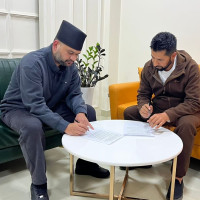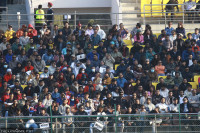Opinion
South Asian tales
The fate of Saarc hangs in the balance as India-Pakistan tensions rise to new highs
Kamal Dev Bhattarai
When Narendra Modi was elected prime minister of India in 2014, he invited the heads of government of the member countries of the South Asian Association for Regional Cooperation (Saarc), including Pakistani Prime Minister Nawaj Sharif to his swearing-in ceremony. Modi also made a surprise stopover in Pakistan to meet his counterpart while returning from a visit to Russia in December 2015.
The two countries attempted to start a Comprehensive Bilateral Dialogue to resolve outstanding issues including Jammu and Kashmir. In December 2015, they directed their foreign secretaries to work out the modalities of such a dialogue. Following a terrorist attack on Pathankot Airbase last January, relations between the two countries began to sour. Scheduled diplomatic talks were postponed after India accused the Pakistani-based Jaish-e-Mohammad of conducting the attack.
In November 2014, when Modi attended the Saarc Summit in Kathmandu, he initiated a number of measures to push the regional grouping ahead. It was expected that Modi would boost Saarc to make his ‘neighbourhood first’ policy successful. He announced setting up a Saarc satellite, but there has been no progress on this front. Earlier in the year, he had asked the Indian Space Research Organisation to develop the satellite to be offered as a gift to the neighbouring countries.
India believes that Pakistan did not support Indian initiatives to advance Saarc activities. As the largest member of Saarc, it was expected that India would be genuinely committed to making it a vibrant organisation. Pakistan, however, has been claiming that Saarc is not making progress because of India.
The reasons
In recent months, a growing crisis in Jammu and Kashmir has strained ties between the two countries. There were indications that the rising tensions between India and Pakistan would affect Saarc. During a Saarc home minister-level meeting held in Islamabad last August, Indian Home Minister Rajnath Singh was present only briefly. This clearly showed that preparations for the Saarc Summit were not taking place in a proper way. India thought of not attending the Saarc summit in Pakistan after the home minister-level meeting in Islamabad.
Tensions between the two countries reached a peak when 18 Indian soldiers were killed at Uri army camp in a terrorist attack. Ten days after that, India mounted ‘a surgical strike’ across the Line of Control targeting terrorists. The 19th Saarc Summit scheduled to be held in Islamabad from November 9-10 has been cancelled for an indefinite period after India decided to pull out. Serious questions about the fate of the three-decade-old regional body have arisen following the cancellation of the conference. India had informed all the countries about its intention to stay away from the summit before making a formal announcement. It had also sought the support of other Saarc members for its decision to boycott the conference. Bangladesh, Sri Lanka and Bhutan supported India’s move to boycott the summit saying that the regional atmosphere was not appropriate for such a meeting.
Indo-Pak tensions
This is not the first time that Saarc has become a victim of India-Pakistan tensions. There are clear signs that Saarc will continue to suffer due to tussles between the two nuclear power countries. If relations between India and Pakistan do not improve, Saarc will not make progress. India has also been mulling a regional body excluding Pakistan.
In recent days, India has been promoting sub-regional bodies such as the Bay of Bengal Initiative for Multi-Sectoral Technical and Economic Cooperation (Bimstec) and Bhutan, Bangladesh, India and Nepal (BBIN). Saarc would likely have been an outreach partner at the Brazil, Russia, India, China and South Africa (Brics) Summit if there had
been no tensions between India and Pakistan. As the organiser of Brics, India had invited the heads of government of Bimstec to the retreat meeting. Pakistan is not a member of either of the sub-regional bodies.
However, it is also a fact that a sub-regional body like BBIN has not been able to make any substantial progress. Bhutan’s Upper House is yet to endorse part of the framework under BBIN. There are several other reasons including border management behind the failure of BBIN to take shape. As the Modi government is now focusing on connectivity projects, India plans to increase its ties through bilateral projects with South Asian countries and these sub-regional bodies.
Need of the hour
Saarc has not been able to make satisfactory progress since its establishment due to multiple reasons. After 1990 when Saarc countries opened up to the world, regional cooperation and connectivity was inevitable, but the association failed to meet these expectations. Now, Saarc’s fate largely depends on how India takes it. If it really wants a regional body without Pakistan, the chances of Saarc’s revival are almost nil. India may press current Saarc chairman Nepal to move the venue of the Saarc Summit to other countries.
Pakistan will not be ready to participate in a Saarc Summit held in some other country. It has already communicated to Nepal that it will not accept any proposal to hold the conference elsewhere and that the Saarc Summit will be held when there is an appropriate environment for it. Obviously, all Saarc countries should be united to fight terrorism. A vibrant Saarc is the need of the hour. Notwithstanding the efforts of Saarc chairman Nepal and other member states, the South Asian grouping will move ahead only if India and Pakistan agree to smoke the peace pipe.
Bhattarai is The Kathmandu Post’s Delhi correspondent




 15.12°C Kathmandu
15.12°C Kathmandu









%20(1).jpg&w=300&height=200)

